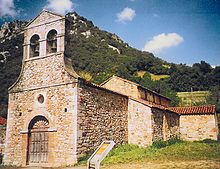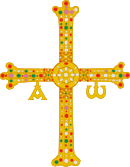| Saint Adrian of Tuñón Santo Adriano de Tuñón(in Spanish) | |
|---|---|
 | |
| Religion | |
| Affiliation | Roman Catholic |
| Province | Asturias |
| Ecclesiastical or organizational status | Church |
| Year consecrated | 891 |
| Location | |
| Location | Santo Adriano, Spain |
| Geographic coordinates | 43°17′29.9″N 5°58′49.9″W / 43.291639°N 5.980528°W |
| Architecture | |
| Type | Church |
| Style | Pre-Romanesque |
| Specifications | |
| Length | 14 metres (46 ft) |
| Width | 10 metres (33 ft) [1] |
The Church of Santo Adriano de Tuñón[ pronunciation?] ( Spanish: Iglesia de Santo Adriano de Tuñón) is a Roman Catholic Pre-Romanesque church in the village of Tuñón, Asturias, Spain dedicated to Saint Adrian.
The church is located on the bank of the River Trubia, next to an old Roman road. Founded on January 24, 891, by Alfonso III of Asturias and his wife Jimena of Navarra as a monastery church, it went through large transformations at the beginnings of the 12th century. It was declared a Spanish national monument in June 1931.
Architecture
The church stands on a classic basilica ground plan, although in the 17th and 18th centuries it was extended with a nave structure at the western end, and a bell gable.
Decoration
Mural paintings were rediscovered in the 20th century. The fresco paintings in this church are the only remains of Mozarabic painters' work in an Asturian art workshop.
See also
Notes
- ^ Arias Paramo 1992, p. 32
References
- Arias Paramo, Lorenzo (1992). "Geometría y proporción en la arquitectura prerrománica asturiana". Actas del III Congreso de Arqueología Medieval Española (in Spanish). Oviedo: Universidad de Oviedo: 27–37. ISBN 84-604-1916-9. Retrieved 2009-05-31.
- Fernández Conde, Francisco Javier; Pedregal Montes, María Antonia (1995). "Santo Adriano de Tuñón: Historia de un territorio en los siglos de transición". Asturiensia Medievalia (8): 79–110. ISSN 0301-889X.
- Jordá Pardo, Jesús Francisco; Carmen Cabo; Gema Elvira Adán Alvarez (1991). "Excavaciones arqueológicas en Santo Adriano de Tuñón ( Santo Adriano, Asturias )". Boletín del Real Instituto de Estudios Asturianos (in Spanish). 45 (137): 357–396. ISSN 0020-384X.
- Mªdel Carmen MARQUEZ URIA (1977) Nº 90-91, Sto.Adriano: Las excavaciones del conde de la Vega del Sella[ permanent dead link], p. 431-446
| Saint Adrian of Tuñón Santo Adriano de Tuñón(in Spanish) | |
|---|---|
 | |
| Religion | |
| Affiliation | Roman Catholic |
| Province | Asturias |
| Ecclesiastical or organizational status | Church |
| Year consecrated | 891 |
| Location | |
| Location | Santo Adriano, Spain |
| Geographic coordinates | 43°17′29.9″N 5°58′49.9″W / 43.291639°N 5.980528°W |
| Architecture | |
| Type | Church |
| Style | Pre-Romanesque |
| Specifications | |
| Length | 14 metres (46 ft) |
| Width | 10 metres (33 ft) [1] |
The Church of Santo Adriano de Tuñón[ pronunciation?] ( Spanish: Iglesia de Santo Adriano de Tuñón) is a Roman Catholic Pre-Romanesque church in the village of Tuñón, Asturias, Spain dedicated to Saint Adrian.
The church is located on the bank of the River Trubia, next to an old Roman road. Founded on January 24, 891, by Alfonso III of Asturias and his wife Jimena of Navarra as a monastery church, it went through large transformations at the beginnings of the 12th century. It was declared a Spanish national monument in June 1931.
Architecture
The church stands on a classic basilica ground plan, although in the 17th and 18th centuries it was extended with a nave structure at the western end, and a bell gable.
Decoration
Mural paintings were rediscovered in the 20th century. The fresco paintings in this church are the only remains of Mozarabic painters' work in an Asturian art workshop.
See also
Notes
- ^ Arias Paramo 1992, p. 32
References
- Arias Paramo, Lorenzo (1992). "Geometría y proporción en la arquitectura prerrománica asturiana". Actas del III Congreso de Arqueología Medieval Española (in Spanish). Oviedo: Universidad de Oviedo: 27–37. ISBN 84-604-1916-9. Retrieved 2009-05-31.
- Fernández Conde, Francisco Javier; Pedregal Montes, María Antonia (1995). "Santo Adriano de Tuñón: Historia de un territorio en los siglos de transición". Asturiensia Medievalia (8): 79–110. ISSN 0301-889X.
- Jordá Pardo, Jesús Francisco; Carmen Cabo; Gema Elvira Adán Alvarez (1991). "Excavaciones arqueológicas en Santo Adriano de Tuñón ( Santo Adriano, Asturias )". Boletín del Real Instituto de Estudios Asturianos (in Spanish). 45 (137): 357–396. ISSN 0020-384X.
- Mªdel Carmen MARQUEZ URIA (1977) Nº 90-91, Sto.Adriano: Las excavaciones del conde de la Vega del Sella[ permanent dead link], p. 431-446
